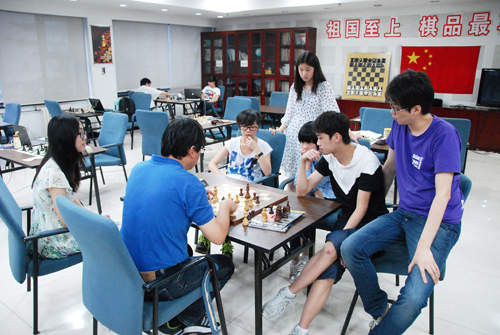|
 |
|
SKILLED MANEUVERS: Ye Jiangchuan (second left, seen from behind), head coach of the Chinese chess team, offers advice to his students at the Chinese Chess Academy on September 2 (WEI YAO) |
Life in black and white
In spite of his young age, Yu has already made remarkable achievements in the chess field, becoming a grandmaster—the highest title a chess player can attain apart from world champion—at the tender age of 15 and winning the championship title at last year's World Junior Chess Championship in Turkey.
Yet Yu's appearance is no different from that of any common-or-garden college student. He sports a pair of thin-framed glasses and casual wear, attributing his wild success to both his concerted efforts and his gift for the game.
Talking about his life, he said it may seem boring to others. His days are spent at the Chinese Chess Academy in Beijing and he divides his time between training and traveling both at home and abroad for matches.
His daily life, in his words, is consumed by chess. "Without a deep love for the game, one would not be able to persevere," he told Beijing Review.
"I have stuck with this game for so long because I want to really make the most of my talent for this. I don't know what else I can take up as a career except chess. It's lucky to find a line of work one really takes pleasure in," said Yu.
Yu started to play chess at the age of 7. Back then, his primary school offered several extra-curricular courses. Yu opted for chess, as his parents considered the game "more international" than Chinese chess.
Selected to train at the Chinese Chess Academy in Beijing at 11, after winning the 2004 World Youth Chess Championship, Yu was still too young to live away from his home in central China's Hubei Province alone. His father quit his job and rented an apartment in Beijing to look after him. "My father didn't go back home until the beginning of this year," Yu said.
He became a formal member of the national team in 2010 after being awarded the grandmaster title a year earlier, and now ranks at No. 47 in the world.
"There were times when I questioned my pursuit, especially when I lost a game or found it hard to improve further after reaching a certain level," said Yu. Had it not been for a small error he made at last year's World Chess Team Championship, his team would have won the gold. Yu felt immense regret and questioned his abilities. Fortunately, he said, all of those negative thoughts have been overcome.
International advances
In spite of the Chinese chess team's achievements at this year's Olympiad, what is known in the country as "international chess" is still a relatively unpopular game. Before 1990, fewer than 20,000 people in China knew how to play it. Despite having a history over 2,000 years long, the game didn't really take off in China until 1991, when Xie won the women's world championship.
The Chinese Chess Association estimates there are currently 600 million people worldwide who can play chess. In China, there are now 10 million chess players, but the number of those who regularly register for matches is only 300 to 400, of whom just 60 to 70 are professional players.
Compared with Chinese chess, the international version has a weaker cultural tradition in China. Ye said one of the difficulties of promoting the game is the lack of professional teachers. As an "international chess" pioneer in China, Ye has done a lot to promote the game nationwide, including giving lessons at Peking University.
At present, the Chinese Chess Association is building an online platform which offers distance teaching and opportunities to carry out online matches. The platform will be put into operation at the end of this year or the beginning of next year.
"Only by enlarging the talent pool of young chess players can the Chinese chess team have stronger players to choose from and put on better performances in international competitions," said Ye.
Talking about his future plan, Yu said that his long-term goals are as yet unclear. In the short term, he hopes to concentrate on training and improving his grade and making it into the global top 20 players. For now, however, his greatest intellectual challenge remains finishing his studies at Capital Sports University in Beijing next year.
Email us at: jijing@bjreview.com | 